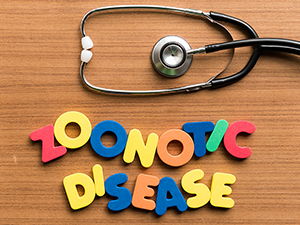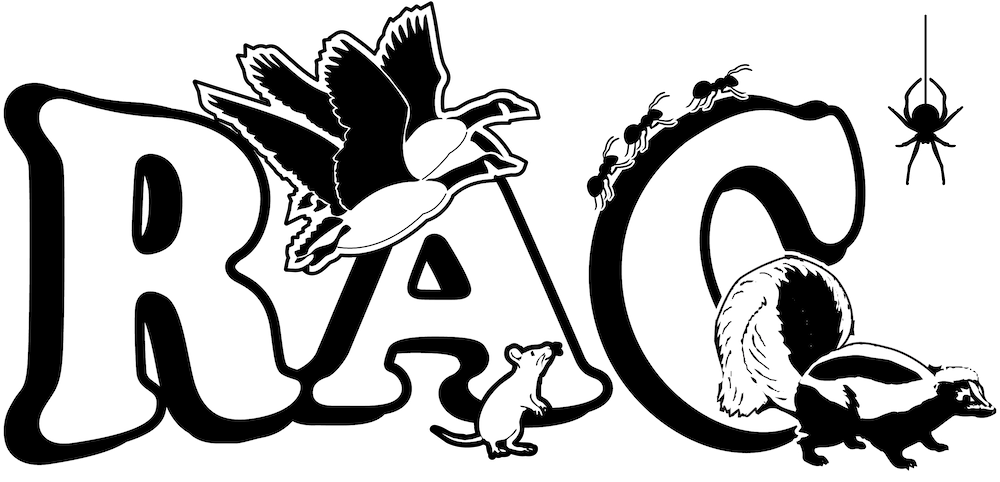Understanding Zoonotic Diseases & How to Protect Your Pets

Discovering wild animals like raccoons, skunks, or birds around or inside your home can be alarming, especially when considering the potential health risks they pose to you and your pets.
Zoonotic diseases — diseases that can be transmitted from animals to humans — are a significant concern for pet owners. Here’s what you need to know about some common pathogens and how to keep your furry friends safe.
Rabies: A Serious Threat
Rabies is perhaps the most well-known zoonotic disease, and for a good reason. It’s a viral infection that affects the nervous system and is almost always fatal once symptoms appear. Wild animals like raccoons, skunks, and bats are common carriers.
It’s important to note that, contrary to popular thought, rabies can be transmitted not just through bites but through any contact with an infected animal’s saliva, such as through a scratch or an open wound, or by touching the eyes or mouth after handling a sick animal.
Prevention Tips:
- Vaccination: ensure your pets are up to date with their rabies vaccinations
- Avoidance: keep your pets on a leash and steer clear of areas where wild animals are present
- Observation: if you see an animal acting strangely or aggressively, keep your distance and immediately contact a professional wildlife management organization
Leptospirosis: Hidden Dangers
Leptospirosis is a bacterial disease that can impact both humans and animals. It’s often spread through the urine of infected animals and can contaminate water sources, soil, and food.
Common carriers include rodents, raccoons, and even livestock. You can also contract leptospirosis through contaminated surfaces, such as items in your pantry that mice may have scurried over, leaving behind infected urine or feces from their paws.
Prevention Tips:
- Clean Water: ensure your pets have access to clean drinking water and avoid letting them drink from puddles or other stagnant water sources outdoors
- Hygiene: regularly clean areas where your pets eat and sleep
- Vaccination: ask your vet about the leptospirosis vaccine for your dog, especially if you live in an area with a high prevalence of the disease
Giardia: Water-Borne Risks
Giardia is a parasitic infection commonly found in dogs and cats that causes stomach upset, dehydration, weight loss, and more. It is often contracted through ingesting contaminated water or feces (frequently goose feces), including puddles in your backyard that might contain the parasite.
Prevention Tips:
- Supervision: keep an eye on your pets when they are outdoors, especially in areas where they might drink from stagnant water
- Avoidance: prevent your pets from eating feces or drinking from unknown water sources
- Cleanliness: regularly clean and disinfect areas where your pets spend time to reduce the risk of infection
Lyme Disease: Tick-Borne Trouble
Lyme disease is a bacterial infection transmitted through the bite of infected black-legged ticks, commonly known as deer ticks. Pets — especially dogs — are at risk of contracting Lyme disease if they spend time in grassy or wooded areas.
Prevention Tips:
- Tick Prevention: use vet-recommended tick prevention products on your pets
- Regular Checks: inspect your pets for ticks after they’ve been outdoors
- Yard Maintenance: keep your yard well-maintained and free of tall grass or leaves to reduce tick habitats
Raccoon Roundworm: Little-Known Hazard
Raccoon roundworm, or Baylisascaris, is a parasitic worm found in the intestines of raccoons. Pets can become infected by ingesting raccoon feces or through contact with areas where raccoons have been. The eggs of the parasite can also become aerosolized, making them easily transferable.
Warning: this infection can cause severe neurological damage and even blindness in both humans and pets.
Prevention Tips:
- Supervision: monitor your pets closely when they are outdoors to make sure they do not come into contact with raccoons or other wild animals
- Cleanliness: regularly clean areas where raccoons may frequent to reduce the presence of feces and eggs
- Awareness: be aware of the symptoms of raccoon roundworm infection, such as uncoordinated movements and lethargy, and seek veterinary care immediately
Keeping Your Pets Safe
While the thought of zoonotic diseases can be frightening, taking proactive measures can significantly reduce the risk to your pets. Here are some general tips:
1. Use a Leash: always use a leash when walking your pets to prevent them from wandering into areas where wild animals might be present
2. Stay Alert: be vigilant for signs of wild animals in your yard or neighborhood and take appropriate action to avoid contact
3. Contact Professionals: if you encounter a wild animal or suspect that your pet may have been exposed to a zoonotic disease, don’t hesitate to contact Rusty’s Animal Control — we’re here to help ensure the safety of both you and your pets
While it’s natural to be concerned, taking these steps can help protect your pets from zoonotic diseases. At Rusty’s Animal Control, we’re committed to keeping your home and your pets safe from wildlife-related risks. If you have any questions or need assistance, reach out to us anytime.
Learn more about zoonotic disease prevention & wildlife management

